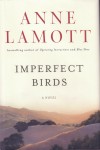Imperfect Birds by Anne Lamott (2009. Riverhead. ISBN 978-1-59448-751-4)
Anyone who is a fiction writer has read (or should read) Ms. Lamott’s classic instructional memoir about creative writing, Bird by Bird. In 237 pages, Ms. Lamott captures the heart, soul, craft, and angst of creative writing and the writing life. I love the book and have used excerpts from it in many, many workshop and lecture settings during my modest career as a semi-famous regional novelist. The examples given, the writing style, the self-depreciating tone of the book are what make Bird by Bird such an exemplary resource.
So, never having read any of the author’s fiction, when I was looking for a “stocking stuffer” for my wife last Christmas (on Christmas Eve like all marginally diligent husbands) and I saw Imperfect Birds in hardcover, I snapped it up for Rene’. I was certain that, given Ms. Lamott’s credentials as a gifted writer (fully displayed in Bird by Bird), Rene’ would love the read. Recently, when I found myself bookless, headed towards a hot bath, and I spied the unread copy of Lamott’s novel on my wife’s nightstand, I picked up Imperfect Birds and brought it into the steam of the master bath. In the solitude that only a hot bath can provide, I began reading the story of Elizabeth, her daughter Rosie, and James, Elizabeth’s second husband and Rosie’s stepfather. As I settled into near scalding water, I was ready to be transported; physically, emotionally, and transcendentally by Ms. Lamott’s work.
It didn’t happen.
Why? I think the reason the book fell so flat for me, in terms of character, dialogue, and setting is that the novel’s 278 pages are nearly devoid of any sort of conflict: emotional or physical. Ostensibly the story of Rosie’s senior year in high school in Marin County, CA and her descent into drug use and casual sex, the writing seems to try a bit too hard to be “hip” and relevant. (As an example: Depictions of oral sex performed by teenagers (as rewards for friendship) don’t really add much to plot unless the author is willing to connect those soulless, desperate acts with something more meaningful. In the end, casual sex is, well, simply casual and not all that interesting.) Yes, there are snippets of conflict and anger and upset between Rosie and her parents throughout the book. But none of these scenes propel the plot or the characters to a place that challenges the reader. I won’t spoil the ending but, suffice it to say, after cruising along on idle for the entirety of the story, the engine of this novel’s plot never moves towards the red line.
Bottom line: Skip this novel and, if you are aspiring author (or just someone who loves to understand what makes writers tick) buy Bird by Bird instead. It’s shorter, cheaper, and a hell of a lot more compelling.
3 stars out of five.



